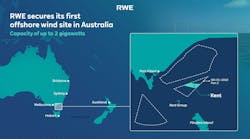Why compete for prospects?
Wil Divine, PresidentWorldwide, countries are competing with one another to attract a relative handful of international operators. These countries actually compete to assist oil companies in the development of resources. By contrast, the US government and environmental organizations have made running an oil company not much fun anymore.
Concessions International
San Ramone, California
Perhaps, while filling countless government-required reporting forms or filing permits, you daydreamed of the oil business the way it was 100 years ago. Maybe, you dreamed that you were the only independent oil company around. And maybe, the only other oil companies were a few majors nice enough to throw away hundreds of new discoveries with less than 50 million bbl, so you could pick them up for nothing. Well, that is the way it is in most countries worldwide.
But, the dream gets better. When you attain the rights to these undeveloped fields, you often get solid contiguous blocks of more than one million acres. Often, all of the initial seismic has been done - the sort of seismic that can identify exploration prospects with reserve potentials of hundreds of millions to billions of barrels. Further, you get all the acreage from one governing body that does everything possible to make your life easier and frequently does not charge you lease rentals.
Think of that, the next time you even try to put together a US lease block with all the heirs, etals, landowners, landmen, delay rentals, title problems, and bonus payments.
Many of the state oil companies and large multinationals working internationally over the past 100 years have discovered thousands of oil and gas fields and mapped countless exploration prospects, but chose for one reason or another not to develop them. Many of these prospects are on open blocks and available to any capable oil operator.
In many oil-prolific countries around the world, there only very few operators. Those few operators have had the luxury of developing only the best discoveries. Many will not develop a field with reserves of less than 50 million bbl, and often the threshhold is 100 million bbl. This leaves thousands of smaller discoveries behind.
In most countries, there are no independent operators who can develop small reserve base prospects. When one does become involved and is able to move on prospects, that operator becomes the only game in town. The government is happy, because it now has the opportunity for free money, and an entity to develop available reserves. In addition, most open blocks have a substantial amount of exploration data (seismic lines) that can used to develop world class prospects with potential reserves of 100 million bbl or greater.
Just about every oil productive country in the world has a number of undeveloped oil and gas discoveries and prospects, and sometimes existing fields available for re-development or enhanced oil recovery contracts. Operators need only show a reasonable financial statement and/or a good operating track record.
In many countries, little or no up-front payments are required to obtain a concession. However, some countries charge for data and some expect a signature bonus. With the competition between countries and relatively few international operators, the oil operator generally has the upper hand. Either the country signs your deal the way you want it or you find a more attractive country.
Just one small bit of advice.
Since the days of Spindletop, the oil business has lived on the boom mentality. That mentality is alive and well in the international oil arena. Every few years, one area becomes hot and operators stream in to get a block. The countries take full advantage of this. The intense competition for blocks serves their interests well. However, a few years later, the area is a ghost town and blocks cannot be given away.
This boom mentality generally has nothing to do with the economic merits of one area versus another. I believe it begins with a few companies moving into one area, followed by others fearful of missing out. In the process, tremendous opportunities develop in areas that are not hot, where companies would have little or no competition for blocks that may be far superior to the hot areas.
In order to stimulate a boom, countries hold competitive bid rounds with "dog and pony shows" in major oil cities. Afterward, oil companies bid against each other for blocks. But, why compete against other companies in a bidding war when you can pick up prolific blocks with no competition at all. It's common sense. However, just the way an independent in the US gets ahead - by being a little bit smarter about a particular area than his competitors - holds true for those operating internationally.
This page reflects viewpoints on the political, economic, cultural, technological, and environmental issues that will shape the future of our industry. Offshore Magazine invites you to share your thoughts. Send your manuscript to Beyond the Horizon, Offshore Magazine, Box 1941, Houston, TX 77251 USA. Manuscripts will not be returned.
Copyright 1997 Oil & Gas Journal. All Rights Reserved.




